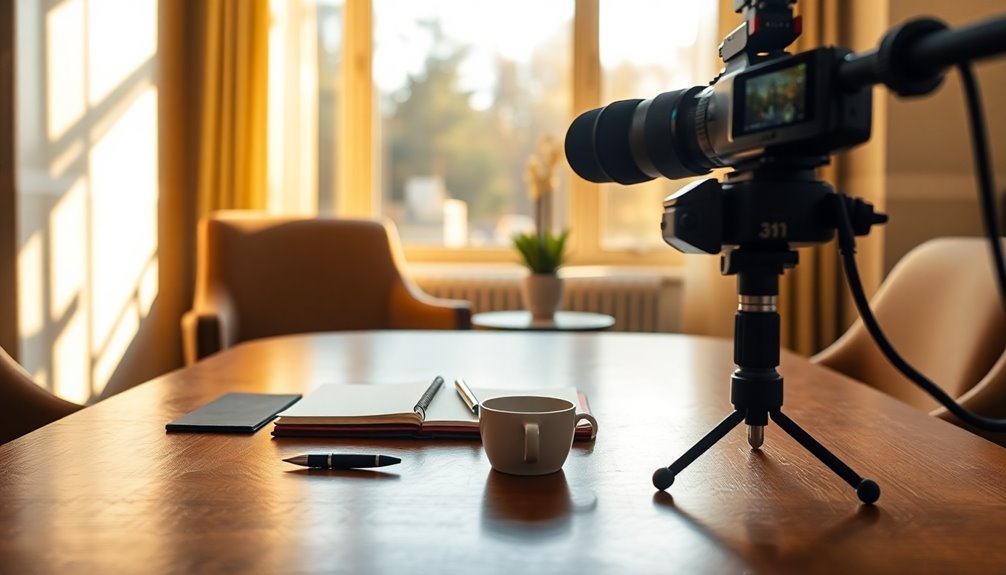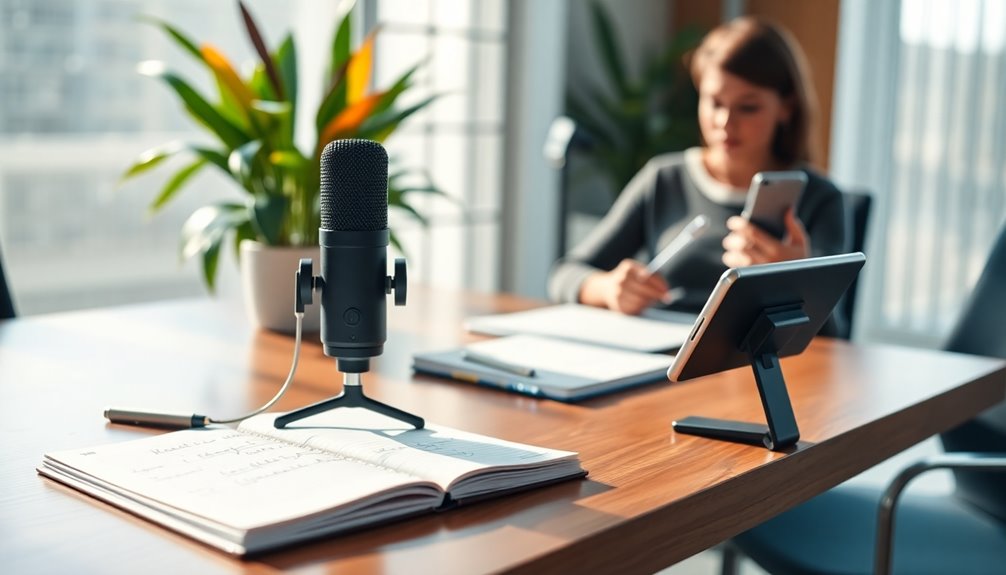To master the perfect interview arrival time, aim to arrive about 15 minutes early. This gives you a chance to settle in, review your resume, and mentally prepare for the discussion ahead. Early arrivals reduce anxiety and demonstrate professionalism, showing that you respect the interviewer's time. If your schedule changes, confirm the new time and adjust your plans accordingly. On the rare chance you arrive too early, find a nearby café to relax until your interview. These strategies will set you up for success, and there's more to explore to enhance your preparation even further.
Key Takeaways
- Aim to arrive 15 minutes early to mentally prepare and reduce anxiety before the interview.
- Confirm any schedule changes promptly to ensure you arrive on time.
- Plan your route in advance, considering traffic and public transport delays.
- If you arrive too early, find a nearby café or library to relax without stress.
- Use extra time to complete paperwork or review your resume and interview questions.
Optimal Arrival Time

Arriving at the interview about 15 minutes early is generally the sweet spot for ideal timing. This window allows you to settle in and gather your thoughts without feeling rushed.
You can review your resume, practice your answers, or even complete any necessary paperwork. Once you arrive, make sure to notify the administrative staff so they can inform your interviewer of your presence.
This early arrival can also pave the way for the possibility of starting the interview ahead of schedule. By taking this time, you'll feel more prepared and composed, ready to showcase your best self during the interview.
Benefits of Arriving Early

Being 15 minutes early offers numerous advantages that can greatly impact your interview experience.
First, it gives you time to review your resume and prepare mentally, ensuring you're focused and ready.
Arriving early also allows you to complete any necessary paperwork without feeling rushed, which can ease your mind.
You can take a moment to relax, grab a drink, or use the restroom, helping to reduce pre-interview anxiety.
Plus, being early might even lead to the opportunity for an early interview, showcasing your enthusiasm.
Finally, arriving on time demonstrates your professionalism and respect for the interviewer's schedule, leaving a positive impression before you even step into the room.
All these factors contribute to a more confident and successful interview.
Adjusting to Schedule Changes

When faced with a change in your interview schedule, it's vital to adapt quickly and effectively. If the manager requests an earlier arrival, adjust your plans accordingly.
For instance, if your interview is now at 1:45 p.m. instead of 2 p.m., streamline your preparations to guarantee you arrive on time. Use this extra time to complete necessary paperwork or familiarize yourself with the office environment.
It's important to confirm the new time with the hiring team to prevent any confusion. Remember, being flexible shows your professionalism and willingness to accommodate.
Embrace these changes as opportunities to demonstrate your organizational skills and readiness for the role. Adaptability can leave a lasting positive impression on your interviewers.
Strategies for Timely Arrival

Punctuality can set the tone for your entire interview experience, so having a solid plan for timely arrival is essential. Start by researching your commute time based on your transportation method. Factor in potential traffic patterns during peak hours or delays with public transport. Practice your route beforehand to guarantee familiarity and comfort. Set reminders to leave on time and avoid last-minute rushes. Additionally, consider that cybersecurity vulnerabilities in various sectors can lead to increased stress, making it even more crucial to arrive prepared and composed.
Here's a quick reference table to help you plan:
| Strategy | Action | Benefit |
|---|---|---|
| Research commute time | Check maps and traffic | Accurate arrival estimate |
| Practice the route | Drive or walk beforehand | Familiarity with surroundings |
| Set reminders | Use phone alarms | Guarantee timely departure |
| Account for delays | Leave early | Reduce stress and anxiety |
| Prepare mentally | Review materials | Boost confidence before interview |
Handling Excessive Early Arrival

Arriving too early for an interview can create unnecessary stress and lead to awkward waiting periods. If you find yourself with extra time, take a moment to explore the area around the interview location. Familiarizing yourself with the surroundings can ease anxiety and boost your confidence.
Alternatively, seek a nearby café or library where you can comfortably wait. Use that time wisely by reviewing your interview materials or preparing thoughtful questions for the hiring manager.
Setting an alarm on your phone can help you keep track of time and guarantee you leave for the interview on schedule. Remember, it's better to arrive a bit closer to the scheduled time than to risk the discomfort of being excessively early.
Frequently Asked Questions
What Should I Wear for an Interview?
When you're deciding what to wear for an interview, aim for professional attire that aligns with the company culture. A tailored suit or a smart dress is often a safe choice.
Make sure your clothes are clean and pressed, and don't forget about your shoes—opt for polished, professional footwear.
Accessories should be minimal, and your grooming should be neat.
Feeling confident in your appearance can boost your performance during the interview.
How Should I Greet the Interviewer?
When you greet the interviewer, start with a warm smile and a firm handshake.
Make eye contact and confidently say, "It's great to meet you." You can also express gratitude for the opportunity to interview.
Keep your tone friendly and professional, setting a positive atmosphere right from the start.
Remember to maintain good posture and be attentive, as this will show your enthusiasm and respect for the interview process.
What if I'm Running Late?
What do you do if you're running late? First, stay calm—panicking won't help.
Quickly notify the interviewer or the company about your delay. Apologize sincerely when you arrive, and don't dwell on the issue.
Focus on your qualifications and the conversation at hand instead. Remember, everyone understands that life happens, but how you handle it can show your professionalism.
Keep your composure, and showcase your best self during the interview.
Can I Bring a Friend or Family Member?
You shouldn't bring a friend or family member to your interview.
Interviews are professional settings where you need to demonstrate your individual qualifications and confidence. Arriving solo helps you focus and make a good impression.
If you need support, consider discussing your feelings with someone beforehand.
Once you're in the interview, all attention should be on you, allowing you to showcase your skills and personality effectively.
What Are Common Interview Questions I Should Prepare For?
Imagine you're a knight preparing for a quest. Common interview questions are your dragons to slay. You should prepare for inquiries like "Tell me about yourself" or "What are your strengths and weaknesses?"
These questions reveal your character and skills. Anticipate behavioral questions like, "Describe a challenge you faced."
Conclusion
Mastering your arrival time isn't just about being on time; it can seriously boost your chances of landing the job. Did you know that candidates who arrive 10-15 minutes early are perceived as more organized and motivated by 70% of hiring managers? By planning ahead and using those extra moments wisely, you can calm your nerves and make a lasting impression. So, next time you've got an interview, remember: timing is everything!









